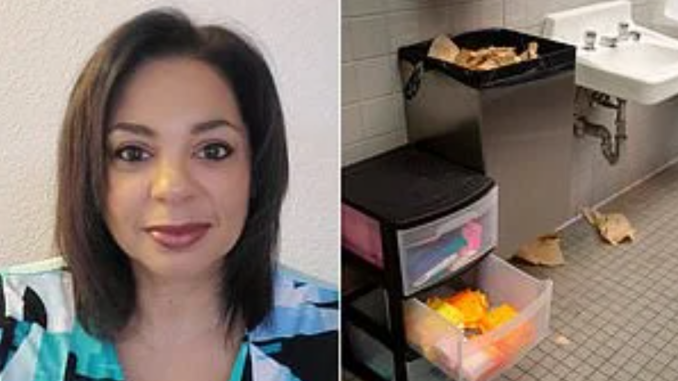
Oregon mom blasts woke new state law calling for free tampons in all BOYS’ school bathrooms and says cash should be spent on books and supplies
An Oregon mother is fighting back against a new state law calling for free tampons in all boys’ school bathrooms – saying the money could be better spent on textbooks and supplies.
Cherylene Stritenberg, a member of the Eagle Point School District, has petitioned the Oregon Department of Education to roll back the Menstrual Dignity Act – single-handedly triggering a two-week comment period on the law before it goes into effect for the next school year, Oregon Live reports.
The law requires public schools, community colleges and universities to provide free menstrual products in all bathrooms, including those designated for boys as young as kindergarten.
It aims to be inclusive of children who are transgender and non-binary, but Stritenberg says the cash could be far better spent.
Cherylene Stritenberg has petitioned the Oregon Department of Education to roll back the Menstrual Dignity Act, which requires school districts to provide tampon and menstrual pad dispensers in all bathrooms, including those designated for boys as young as kindergarten
Stritenberg, who has previously petitioned the state to lift its COVID vaccine requirement for teachers and volunteers, though, says the law is creating an added expense in a state that struggles to graduate more than 80 percent of its high school students.
In fact, the Oregon Legislative Revenue Office estimated last year that the state would direct about $5.6 million from the State School Fund in the first two years – which is enough to pay for about 30 teachers’ salaries each year.
‘Don’t get me wrong, I’m not opposed to making these products available, but requiring we divert funds from our State School Funds to ensure they are included specifically in boys’ bathrooms is a misuse of those funds,’ Stritenberg said, suggesting the money be used instead for new textbooks and supplies.
‘My hope is that we can re-evaluate and come to a better solution that is financially responsible and beneficial to those who need it,’ she added.
The Menstrual Dignity Act was originally introduced in the Oregon state legislature by Democratic Rep. Ricki Ruiz, and was widely supported in the Oregon House of Representatives – with all but one Republican voting in favor of it.
Advocates claimed that providing free universal access to period products will alleviate unnecessary shame and expense for students going through puberty, Oregon Live reports.
That is widely-supported – although advocates say supplying the products in boys’ bathroom is a sop to wokeness and an unnecessary waste of money.
The original version of the bill only required schools to provide products in gender-neutral and girls’ bathrooms, and as the program rolled out last year, districts had to provide free tampons and pads in ‘at least two bathrooms,’ but had the discretion to pick which ones.
The law was later expanded to include all bathrooms designated for boys, so that transgender and non-binary students may have access to these products.
‘As we know, there’s a lot of our youth who don’t identify as female or male, or are transitioning genders,’ Ruiz said. ‘We wanted to respect that and make sure we provide these resources in all restrooms for folks who may be struggling to transition to a different restroom.’
It is now the most expansive menstrual products bill on the West Coast, according to Oregon Live.
In California, high costs forced lawmakers to scale back their 2021 law to include only school bathrooms in grades six through 12, including in at least one boys’ bathroom per school.
Community colleges and state universities are also required to have at least one location on campus where students an access these products.
And in Washington state, public and private schools are required to provide menstrual products in all gender-neutral and female bathrooms for students in grades six through 12.
If a school does not have a gender-neutral bathroom, they are required to put menstrual hygiene products in at least one male bathroom.
The law also requires that students in grades three through five have access to these products in at least one location.
But Oregon’s law goes further and requires tampons and pads in boys’ bathrooms for children as young as kindergarten – which Stritenberg says is a waste of resources, and worries students will misuse the products and cause damage to the facilities.
Tampons and sanitary towels are displayed in a school bathroom, with Oregon coming under fire over a new state law demanding they be supplied in all boys’ school bathrooms
Already, Oregon Live reports, the Beaverton School District, Portland Public Schools and David Douglas School District have spent hundreds of thousands of dollars on the new dispensers for all bathrooms, though state officials are supposed to reimburse the school districts for the costs.
Portland spent about $200,000 on products and dispensers, including larger units for gender-neutral and girls bathrooms, and smaller units for boys’ bathrooms.
The Beaverton School District, meanwhile, has spent close to $300,000.
Now, Stritenberg is trying to halt the move, petitioning the state to allow for public response before the law goes into effect.
The Department of Education has 90 days to respond to the petition.
If state officials were to roll back the rule, districts may continue to provide the products in boys’ bathrooms, and in the Beaverton School District, Josh Gamez, the chief facilities officer, said the district would want to hear from its community before making a decision.
‘If the product is being used, we want to support that,’ he said. ‘This is for the students.’
Daphne Ischer, who graduated from high school this spring, said she wants to see the broader law stay in place.
She previously said it is important for transgender and non-gendered students to feel accepted.
‘There’s not always gender-neutral bathrooms, there’s not always a lot and there’s not always complete access to them,’ she said as she testified in favor of the bill last year.
Ischer added that she sees the universal presence of dispensers as an opportunity to start teaching younger students about periods and menstrual hygiene.
‘When we start these conversations in the classrooms earlier, and those conversations continue, periods become less stigmatized.’
Ruiz also said he is confident the bill will remain intact, though he said he would be willing to make amendments if necessary.
* Article from: dailymail.co.uk
(*) www.WhitePrideHomeSchool.com


